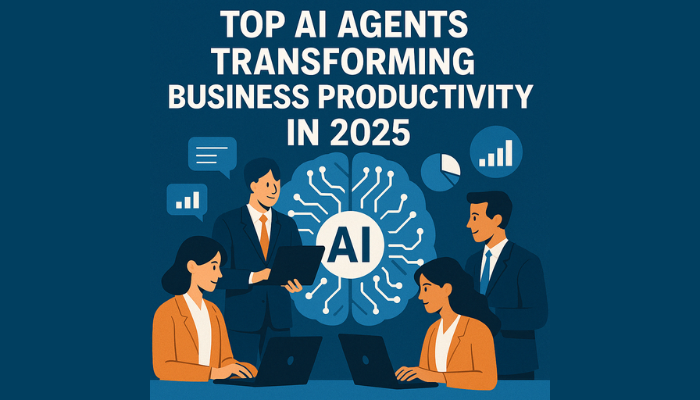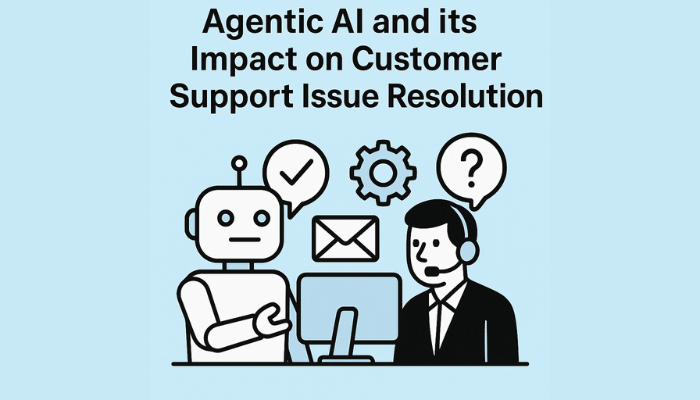AI agents are already changing how businesses operate. From handling customer queries in seconds to automating entire business processes, these intelligent agents are reshaping industries and improving efficiency across the board. In fact, a recent study found that 72% of businesses have already started using AI-driven tools to automate tasks and boost productivity.
Unlike traditional chatbots or basic AI tools, AI agents work autonomously, taking on complex tasks with minimal human input. The global AI agent market was valued at $5.40 billion in 2024, and it’s set to grow at an explosive 45.8% annually through 2030. This rapid growth signals that AI agents are no longer a “nice-to-have” — they’re essential for businesses looking to simplify operations, cut errors, and stay ahead of the competition.
AI agents are here, and if your business isn’t using them yet, you’re already behind!
So, what exactly are AI agents? Simply put, they’re like your business’s smart helpers—working on their own, making decisions, and learning as they go. No constant human input required.
What Are AI Agents?
AI agents are autonomous systems that use artificial intelligence to perform tasks and make decisions without human intervention. They can analyze data, learn from their environment, and take actions based on that information—whether it’s answering customer inquiries, automating workflows, or even making complex business decisions.
Unlike traditional AI tools that require constant input, AI agents work independently, continuously improving over time as they gain more experience.
Also Read: Step-by-Step Guide on Building AI Agents for Beginners
Top AI Agents Shaping Business in 2025
AI agents come in various forms, each designed to tackle specific business needs. Here are some of the top AI agents that are revolutionizing business productivity in 2025:
1. AI Agents for Automation
AI agents for automation focus on streamlining repetitive, time-consuming tasks. These agents are designed to take over routine business processes, enabling businesses to operate more efficiently and with fewer errors. By automating tasks like data entry, scheduling, and inventory management, AI agents allow employees to focus on higher-value work.
Here are three tools leading the charge in this category:
UiPath
UiPath is a powerful robotic process automation (RPA) platform that helps businesses automate manual, repetitive tasks. From data entry to document handling, UiPath uses AI to mimic human actions and perform complex tasks without human input, dramatically increasing operational efficiency.
Key Features:
- Robotic Process Automation (RPA): Automates tasks such as data entry, invoicing, and document processing.
- Advanced Analytics: Provides insights into how business processes can be improved, highlighting inefficiencies.
- AI-Powered Decision-Making: Uses machine learning to optimize workflows and make intelligent decisions in real-time.
- Seamless Integration: Works with popular enterprise systems like ERP, CRM, and HR software.
Best For:
- Enterprises looking to scale operations without increasing headcount.
- Businesses need efficient, high-volume process automation.
Automation Anywhere
Automation Anywhere combines RPA with artificial intelligence to help businesses automate complex workflows across various industries. With its ability to learn from patterns and adapt, Automation Anywhere’s AI agents can handle more sophisticated tasks, helping businesses improve efficiency while reducing operational costs.
Key Features:
- Intelligent RPA: Automates complex processes beyond simple tasks, adapting and learning from data.
- AI-Driven Insights: Analyzes workflows and provides recommendations for improvement.
- Automated Document Processing: AI-powered agents can read and process documents, extracting relevant data.
- Cloud-Native: Fully cloud-based, offering scalability and flexibility for businesses of all sizes.
Best For:
- Companies seeking to automate both simple and complex tasks.
- Businesses that need scalability and AI-enhanced automation across departments.
Zapier
Zapier is a user-friendly tool that automates workflows between over 5,000 web apps, allowing businesses to connect apps like Gmail, Slack, and Google Sheets without writing any code. By automating tasks that occur across different tools, Zapier simplifies business operations and saves time.
Key Features:
- Easy-to-Use Interface: No coding required to create automated workflows.
- 5,000+ App Integrations: Supports a wide range of apps like Google Sheets, Slack, Trello, and more.
- Real-Time Task Automation: Automatically transfers data and triggers tasks across apps in real time.
- Task History & Notifications: Track and monitor the execution of automated tasks for better visibility.
Best For:
- Small businesses looking for simple automation solutions without technical expertise.
- Teams that use a variety of apps and want to connect them seamlessly for smoother workflows.
2. AI Agents for Marketing
AI agents in marketing are designed to enhance customer engagement, optimize campaigns, and deliver personalized content at scale. By analyzing customer data, predicting trends, and automating tasks like content creation and email marketing, these agents enable businesses to run more effective and targeted marketing strategies.
Here are three tools leading the way:
SEObotAI
SEObotAI is an AI-driven platform that automates key SEO tasks and content creation to help businesses boost their online presence. It uses intelligent algorithms to optimize websites, create SEO-friendly content, and track performance, allowing businesses to focus on growing their digital footprint.
Key Features:
- Programmatic SEO: Automates the SEO optimization process, ensuring websites rank higher in search engines.
- AI-Driven Keyword Research & Optimization: Identifies and targets the best keywords for your business.
- Continuous Website Performance Monitoring: Tracks performance and adjusts SEO strategies in real-time.
- AI-Powered Content Generation: Generates SEO-friendly content for blogs, marketing campaigns, and more.
Best For:
- SEO specialists aiming to improve search rankings.
- Digital marketers looking for automated content creation and optimization.
- eCommerce businesses with large catalogs and multiple pages.
Don’t Skip: AI Agents Transforming Retail and E-Commerce
HubSpot
HubSpot’s marketing automation tool helps businesses automate email marketing, lead nurturing, and customer engagement. With AI-powered lead scoring and personalized campaign workflows, HubSpot ensures that your marketing efforts are focused on the right prospects, increasing conversion rates.
Key Features:
- AI-Driven Lead Scoring: Scores leads based on behavior and interaction with your website or emails, ensuring high-quality leads are prioritized.
- Automated Email Workflows: Creates personalized email campaigns that nurture leads automatically, improving conversion rates.
- Chatbot Integration for Lead Generation: Engages visitors through chatbots and captures valuable lead data.
- Analytics and Reporting: Provides insights into campaign performance, helping businesses optimize marketing strategies.
Best For:
- Marketing teams looking to automate email campaigns.
- Businesses aiming to nurture leads and improve conversions.
- Companies that need a comprehensive marketing automation solution.
Marketo
Marketo is an AI-powered marketing automation platform designed to help businesses scale their marketing efforts. It provides advanced features for personalized content, audience segmentation, and multi-channel campaign management.
Key Features:
- Audience Segmentation: Uses AI to segment audiences based on behavior and demographics, ensuring personalized marketing efforts.
- AI-Powered Content Recommendations: Recommends content to users based on past interactions, increasing engagement.
- Multi-Channel Campaign Automation: Manages email, social media, and digital ad campaigns, ensuring a cohesive marketing strategy.
- Lead Nurturing and Scoring: Automates lead management by scoring and nurturing leads through the sales funnel.
Best For:
- Companies that need advanced audience segmentation and personalized campaigns.
- Marketing teams managing large-scale, multi-channel campaigns.
- Businesses focused on optimizing lead generation and nurturing.
3. AI Agents for Customer Service
AI agents in customer service help businesses provide fast, efficient, and round-the-clock support to customers. These agents handle common queries, manage customer interactions, and solve problems, all without human intervention, enhancing customer satisfaction and reducing response times.
Here are three tools that excel in this space:
Zendesk AI
Zendesk’s AI-powered customer service platform automates support tasks, enhances customer interaction, and reduces response time by using chatbots and AI agents. It’s designed to handle common queries, ticket routing, and problem resolution, ensuring customers get the help they need, when they need it.
Key Features:
- AI-Powered Chatbots: Responds to customer inquiries instantly, improving response times and reducing workload on agents.
- Ticket Routing: Automatically categorizes and routes tickets to the appropriate department for quicker resolution.
- Knowledge Base Automation: Uses AI to recommend solutions from the knowledge base, providing customers with self-service options.
- Customer Satisfaction Insights: Analyzes customer feedback to improve service quality.
Best For:
- Businesses looking to automate customer service and reduce response times.
- Teams that need an efficient way to handle high volumes of support requests.
- Companies seeking to improve self-service options for customers.
LivePerson
LivePerson offers an AI-powered messaging platform for customer service, allowing businesses to communicate with customers via messaging apps, SMS, and chat. Its AI agents assist in resolving inquiries, making them a valuable tool for improving customer service efficiency.
Key Features:
- AI-Powered Messaging: Automates messaging across various channels, improving customer engagement and response time.
- Conversation Analytics: Uses AI to analyze conversations and improve customer service interactions.
- Smart Routing: Automatically routes messages to the best agent or resource based on the customer’s issue.
- AI-Driven Insights: Provides actionable insights to improve customer service strategies and performance.
Best For:
- Businesses focused on multi-channel customer support.
- Teams looking to automate responses and improve customer engagement.
- Companies in need of real-time messaging support.
Freshdesk
Freshdesk is an AI-powered customer service platform that helps businesses manage support tickets, resolve queries, and automate tasks. Its AI agents assist in ticket classification, prioritization, and routing, making customer service operations more efficient.
Key Features:
- AI Ticket Classification: Automatically categorizes tickets, helping agents prioritize issues based on urgency.
- AI-Powered Chatbots: Assists in answering customer questions and solving common problems without involving human agents.
- Automated Ticket Resolution: Provides automatic resolutions for common customer issues, saving time for agents.
- Performance Analytics: Tracks support team performance and provides insights for improvement.
Best For:
- Small to medium-sized businesses seeking an easy-to-use customer service solution.
- Teams looking to automate ticket management and resolution.
- Businesses aim to provide fast and efficient support without increasing staffing costs.
4. AI Agents for Sales
AI agents for sales help automate lead generation, qualification, and nurturing processes, enabling businesses to focus on closing high-value deals. These agents analyze customer data, predict purchasing behavior, and streamline the sales pipeline for greater efficiency.
Here are three tools that are transforming the sales process:
InsideSales
InsideSales is an AI-driven sales platform that helps businesses improve lead conversion by providing insights into the best time to contact prospects and the most effective sales strategies.
Key Features:
- AI-Powered Lead Scoring: Automatically scores leads based on their likelihood to convert, ensuring sales teams focus on the best prospects.
- Predictive Analytics: Uses AI to predict which leads are most likely to make a purchase, optimizing sales outreach.
- Automated Outreach: Sends personalized email sequences to prospects, automating initial contact and follow-up.
- Real-Time Insights: Provides real-time analytics on sales performance and prospect engagement.
Best For:
- Sales teams that need to prioritize high-value leads.
- Businesses seeking to automate follow-up and lead nurturing.
PandaDoc
PandaDoc’s AI-powered document automation tool streamlines the sales process by automating the creation, management, and e-signature of contracts and proposals.
Key Features:
- Automated Proposal Creation: Automatically generates sales proposals, quotes, and contracts based on pre-defined templates.
- AI-Powered Document Insights: Uses AI to analyze documents, ensuring they meet compliance standards and are tailored for each prospect.
- E-Signature Integration: Automates the process of signing and managing contracts, speeding up deal closure.
- Sales Analytics: Provides insights into how well sales documents are performing and how they can be optimized for better results.
Best For:
- Sales teams that need to speed up contract generation and approval.
- Businesses focusing on streamlining sales documentation and approvals.
Drift
Drift is an AI-powered sales chatbot that automates conversations with prospects in real-time, qualifying leads and scheduling meetings with sales representatives.
Key Features:
- Real-Time Chatbot Engagement: Engages prospects immediately, answering questions and qualifying leads before handing them over to the sales team.
- Automated Meeting Scheduling: AI agents schedule meetings with the sales team based on lead availability and interest.
- Lead Qualification: Collects critical data from prospects, qualifying leads based on their responses and intent.
- Integrations with CRM Systems: Seamlessly integrates with CRM tools to ensure all lead information is logged and followed up on.
Best For:
- Sales teams seeking to qualify and engage leads faster.
- Businesses focused on automating lead generation and scheduling.
5. AI Agents for Data Analysis and Insights
With businesses generating more data than ever, AI agents are stepping in to analyze and make sense of it all. These agents help businesses turn massive amounts of raw data into actionable insights, enabling smarter decision-making. By identifying patterns, predicting trends, and offering real-time analytics, AI agents give businesses a competitive edge in data-driven decision-making.
Here are three powerful tools that are enhancing data analysis:
Google Analytics with AI
Google Analytics, enhanced with AI and machine learning, helps businesses analyze website traffic, user behavior, and marketing campaign effectiveness. By leveraging AI, it provides businesses with deeper insights into user journeys, helping to identify which strategies are working and where improvements can be made.
Key Features:
- AI-Enhanced Reports: Provides automated insights into website performance and user behavior using machine learning algorithms.
- Predictive Metrics: AI helps forecast future trends, such as potential website traffic increases or drops, based on current data.
- Behavioral Analytics: Tracks user interactions on your site and helps you understand how users engage with your content, leading to more targeted strategies.
- Integration with Marketing Tools: Works seamlessly with Google Ads, making it easier to track ROI on ad spending and optimize campaigns.
Best For:
- Digital marketers and business owners who want to understand how visitors interact with their websites.
- Companies looking to improve online user experience and campaign effectiveness.
Tableau
Tableau is a powerful data visualization tool that uses AI to help businesses turn complex data into simple, visual insights. Whether it’s sales data, customer behavior, or financial reports, Tableau allows businesses to create interactive and real-time visualizations that make data-driven decisions easier.
Key Features:
- AI-Powered Analytics: Tableau’s AI tools provide suggestions for visualizing data and uncovering insights based on trends.
- Interactive Dashboards: Users can create interactive dashboards that update in real-time to track performance, monitor KPIs, and more.
- Predictive Analytics: Uses machine learning to forecast future trends and outcomes based on historical data.
- Data Integration: Easily integrates with a variety of data sources like SQL, Excel, and cloud-based platforms for seamless data analysis.
Best For:
- Businesses looking to visualize complex data in a digestible format.
- Data analysts and teams who need to monitor performance and predict trends.
IBM Watson Analytics
IBM Watson Analytics is an AI-driven data analysis tool that helps businesses automatically clean, analyze, and visualize data to extract valuable insights. Using natural language processing and machine learning, it makes data accessible to everyone in the organization, even those without technical expertise.
Key Features:
- Automated Data Preparation: AI automatically cleans and prepares raw data, making it ready for analysis without needing a data scientist.
- Natural Language Queries: Allows users to ask questions in plain English and get insights and visualizations based on data analysis.
- Predictive Analytics: Watson’s AI capabilities predict future trends, helping businesses make informed decisions in advance.
- Self-Service Data Exploration: Users can interactively explore their data and gain insights without needing complex training.
Best For:
- Small to medium-sized businesses looking for an easy-to-use, AI-powered data analysis tool.
- Companies looking to bring data-driven decision-making to all employees without requiring a technical background.
These AI agents are unlocking the power of data for businesses, transforming how they analyze and act on information. By utilizing predictive analytics, data visualization, and automated reporting, businesses can stay ahead of the competition and make decisions with confidence.
While AI agents offer huge potential, they come with their fair share of challenges. From integrating AI into existing systems to dealing with costs and data privacy concerns, businesses need to be prepared.
Let’s take a look at what’s holding some companies back and how to tackle these challenges head-on.
Challenges in Implementing AI Agents in Businesses
Adopting AI agents comes with its challenges, but understanding and addressing them can pave the way for smoother integration. Here are the key hurdles businesses face when implementing AI agents:
1. High Initial Costs
Challenge: The upfront investment in AI technology can be significant. This includes not only the purchase of AI tools but also the cost of integrating them into existing systems and training staff to use them effectively.
Solution: While the initial costs may seem high, the long-term benefits of automation, improved efficiency, and reduced operational costs often outweigh the investment. Businesses can start small by implementing AI in specific areas and scaling as they see results.
2. Data Privacy & Security Concerns
Challenge: AI agents often handle sensitive data, which raises concerns about privacy and security. Mismanagement of this data can lead to compliance issues and damage to the company’s reputation.
Solution: To mitigate these risks, businesses must adopt strict security protocols and comply with data protection regulations like GDPR or CCPA. Choosing AI solutions with built-in security features and ensuring proper data encryption can protect sensitive information.
3. Integration with Legacy Systems
Challenge: Many businesses operate on legacy systems that may not be compatible with modern AI tools. Integrating AI into outdated infrastructure can be difficult and time-consuming, often leading to disruptions.
Solution: Businesses can look for AI agents that offer flexible integration options. Working with experienced AI development partners can help smooth the transition by customizing solutions that work well with existing systems.
4. Employee Resistance
Challenge: Employees may be hesitant to embrace AI, fearing job displacement or unfamiliar technology. This resistance can slow down the adoption process and hinder the full potential of AI agents.
Solution: To overcome this, businesses should position AI as a tool that complements human work, not replaces it. By providing training and demonstrating the value of AI in making work easier and more efficient, employees are more likely to embrace the technology.
Addressing these challenges head-on will help businesses successfully implement AI agents and reap the full benefits of automation and innovation.
The future of AI agents is incredibly promising. As technology continues to evolve, AI agents will become even smarter, more intuitive, and capable of handling more complex tasks. From more personalized customer experiences to even greater automation, the possibilities are endless.
Let’s take a look at what’s in store for the next 3-5 years:
The Future of AI Agents in Business
1. More Advanced Automation
AI agents will continue to evolve, taking on more complex tasks that go beyond simple process automation. Expect to see AI agents handling advanced decision-making, improving workflows, and even managing entire departments autonomously.
What This Means: Businesses will be able to automate even more aspects of their operations, further cutting down costs and improving productivity.
2. Improved Personalization
AI agents will play a crucial role in delivering hyper-personalized experiences to customers. As AI gets smarter, it will better understand individual preferences and behavior, offering tailored recommendations, products, and services in real-time.
What This Means: Companies will be able to build stronger customer relationships, offering precisely what each customer needs when they need it.
3. Better Integration with IoT (Internet of Things)
The integration of AI with IoT devices will become even more seamless, enabling businesses to gather real-time data from connected devices and use AI to make instant, data-driven decisions.
What This Means: AI will be able to automate actions based on data from sensors, wearables, and other connected devices, improving everything from supply chain management to customer service.
4. Improved AI Collaboration
AI agents will become more collaborative, working together with human employees in smarter ways. Instead of working in isolation, AI will assist teams by providing real-time suggestions, helping with strategy, and even collaborating on creative tasks.
What This Means: Businesses can expect enhanced productivity as AI and humans work more effectively together, combining the power of technology with human creativity and judgment.
5. Ethical AI and Transparency
As AI usage grows, so will the focus on ethical concerns. The future will see AI systems being developed with stronger ethical frameworks, transparency, and accountability. Companies will need to ensure that their AI agents act responsibly and in line with social, legal, and ethical standards.
What This Means: Businesses that prioritize ethical AI will build stronger trust with customers, improving their brand image and reputation.
In the next 3-5 years, AI agents will play a more significant role than ever, driving innovation, automation, and growth across industries.
So, after reading how AI agents are changing the game, you’re probably thinking: “How can we make this work for my business?” That’s where Codewave comes in.
How Codewave Build AI Agents
At Codewave, we build a diverse range of AI agents—each designed to solve specific business challenges. Our solutions align with foundational AI models and are tailored for real-world productivity:
When we talk about AI agents, here’s what we build:
- Simple Reflex Agents: These agents respond to specific conditions with predefined rules—ideal for automating repetitive tasks like approvals, alerts, or basic responses.
- Model-Based Agents: Maintain an internal understanding of the environment to make smarter decisions—used in systems like dynamic ticket routing or intelligent workflows.
- Goal-Based Agents: Focused on achieving defined business outcomes, such as increasing customer retention or reducing processing time—great for sales automation or lead nurturing.
- Utility-Based Agents: Go beyond goals to maximize business value—helping prioritize actions based on impact, like suggesting the most profitable customer segments to target.
- Learning Agents: Continuously improve through feedback and new data—perfect for personalization engines, fraud detection, or customer service bots that get smarter over time.
- Hierarchical Agents: Operate in layered decision structures—used in complex scenarios like enterprise resource planning or supply chain automation.
- Multi-Agent Systems (MAS): Multiple agents working together to achieve broader objectives—ideal for coordinating across departments, platforms, or distributed workflows.
Each agent is purpose-built, integrated with your business systems, and optimized for performance, scalability, and ROI. See real-world examples of our AI agents in action in our portfolio.
At Codewave, we don’t just build AI agents; we make sure they’re customized to the way your business operates and fit right into your existing systems. We handle everything from initial setup and integration to ongoing optimization, ensuring your AI grows alongside your business.
No more robotic replies—our AI learns, adapts, and delivers human-like conversations.
Up Next: Building Agentic AI Framework: Architecture & Key Components
Codewave is a UX first design thinking & digital transformation services company, designing & engineering innovative mobile apps, cloud, & edge solutions.







